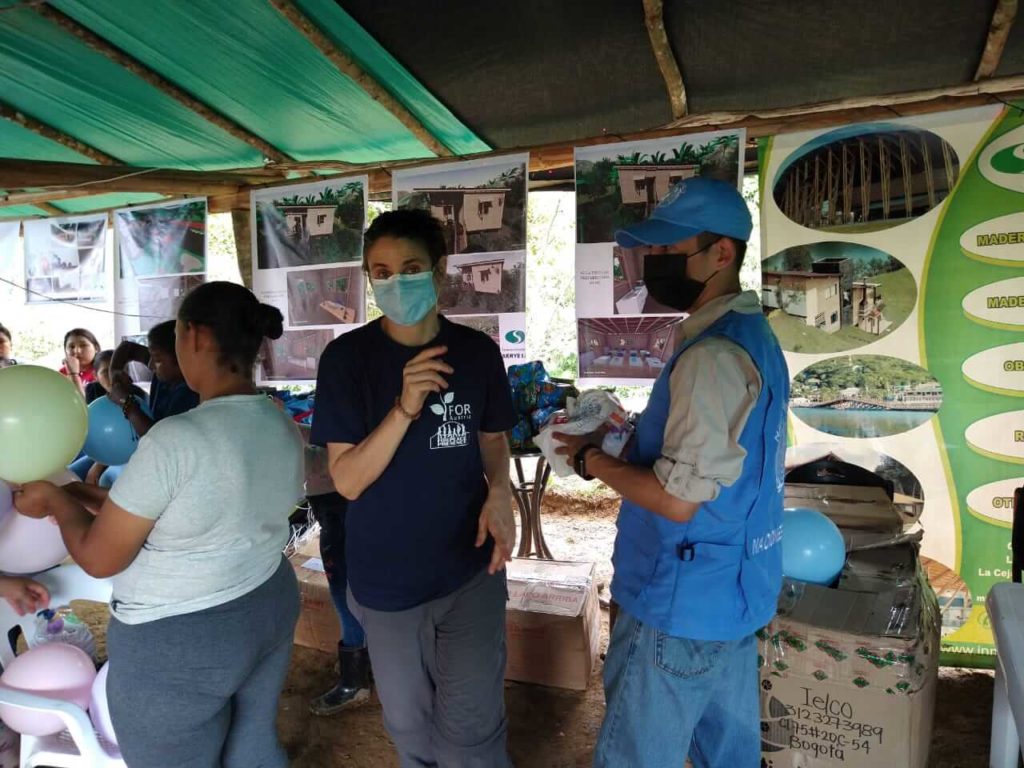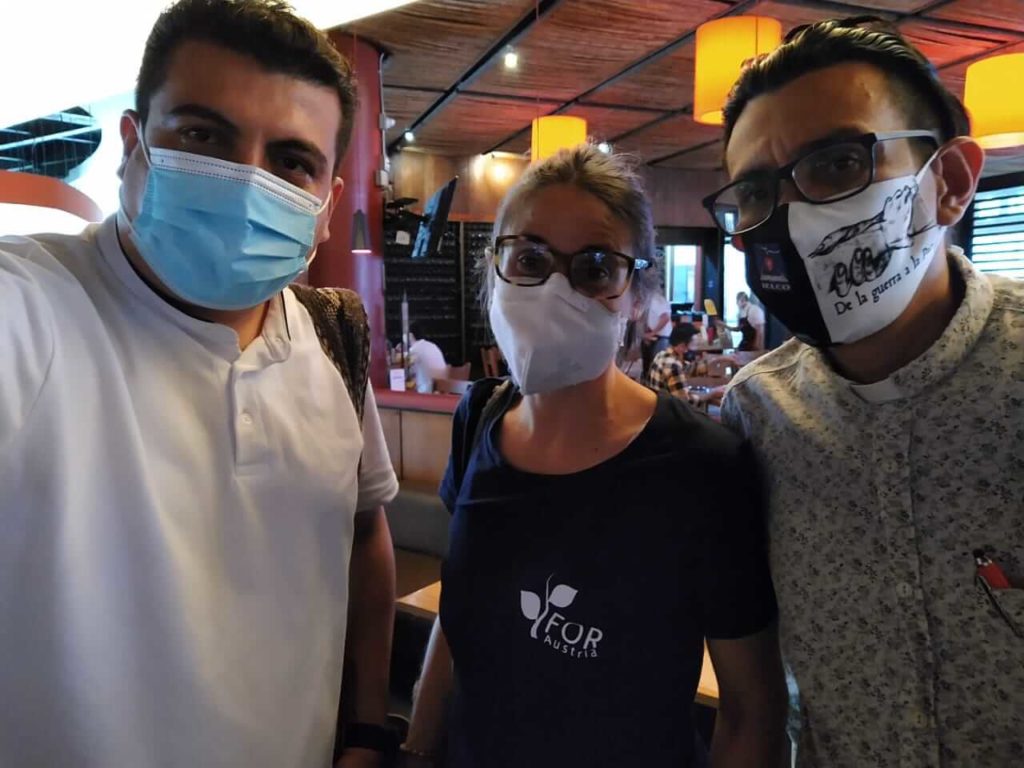Make Your Experiences Count. They Can Change the World.
LET’S BRING ALL OF OUR KNOWLEDGE AND EXPERIENCES TOGETHER.
TOGETHER WE KNOW MORE. TOGETHER WE ACHIEVE MORE. TOGETHER WE DO BETTER.
LET’S BRING ALL OF OUR KNOWLEDGE AND EXPERIENCES TOGETHER.
TOGETHER WE KNOW MORE. TOGETHER WE ACHIEVE MORE. TOGETHER WE DO BETTER.
Published: March 9, 2021
“More haste, less speed.”
This is the slogan that Michaela describes her assignment with. Michaela Söllinger is an unusual new Technical Advisor: She is the first TA ever to set out on an assignment for peace [Correction by the author: I have been made aware of the fact that there has already been one peace assignment in Guatemala with “Guatesoli Österreich” and HORIZONT3000]. Since november 2020, she works in Antioquia, a Colombian state, where she has joined a project run by the “Austrian Fellowship of Reconciliation” with HORIZONT3000. She assists human rights advocates and collaborates with indigenous and afrocolombian advocates as well as small scale peasants and demilitarised guerrilla groups in order to create models for a collective future in peace. How did she end up working for peace building? That’s what she told our colleague Wolfgang Zechner in an interview:
Note: For the German version of this interview, please click here.

Wolfgang: Michaela, could you tell us a bit about how you came to do your assignment in Colombia?
Michaela: That’s due to at least two souls that my body is home to. On the one hand, I am a very curious person, which led me to natural science and technical physics. On the other hand, I have always had a strong sense for justice – even as a little kid. The inequality of opportunities has always provoked rejection in me. That’s the reason why I have collaborated again and again in different social projects in Austria as well as in other countries. I’d say it was curiosity that urged me to search the roots of inequality and made me find projects that approach this issue at its roots. This is how I arrived in Guatemala with Solidarity-Guatemala as a human rights observer. I felt that I was able to contribute something meaningful for the people there in the long run. While I was working there, curiosity hit again and made me want to learn more about peace building. Consequently, I got a master’s degree in peace building and conflict resolution and went to Colombia for the first time. And that’s about it – my mini-version of the “how I ended up doing peace building-story”.
HORIZONT3000 and peace building – that is a whole new chapter for the entire organisation. How has your first impression been so far?
First of all, I am very glad that I got the chance to undertake a Civil Peace Service (ZFD by its German acronoym) through an Austrian organisation. My assignment represents a pilot project and I hope that the ZFD – whose examination is included in a government programme for the first time – will be carried out quickly so that in the future these assignment costs are going to be financed by the state.
Regarding HORIZONT3000 I’d like to highlight that I was quite impressed by the professional and caring atmosphere. I felt really welcome from the very beginning. It is a real collaboration, because a lot of the work was and still is new to everyone involved. They have supported me with visa paperwork, booking flights and accomodations, insurance etc. Even the billing has been very smooth and clear up till now. I find that very pleasant.
What are you in charge of regarding peace building processes?
The current project is part of the international solidarity work from the Austrian Fellowship of Reconciliation (IFOR Austria). In order to describe my work I’m going to use the words from the website, because there aren’t really any better ones: I try to contribute in an active and non-violent way to just and sustainable peace. For the collaboration with the local social organisation in Colombia – FOR Peace Presence – that means non-violently protecting the people, who themselves advocate for the country, life and their dignity in an active and non-violent way. It also means backing up processes of reconciliation and understanding in the sense of implementing the fundamental rights and ensuring a healthy environment for everybody.
I see my contribution in the scope of the work carried out with the local partner organisation and the IFOR Austira in assisting to create and protect constructive relationships between people and their surroundings – above all in Antioquia, the region of my assignment, where there is still an armed conflict taking place. In other words it is about creating and sustaining spaces to come together and take action together. This is how we contribute to foster collective peace initiatives that are driven by the local communities and that aim at maintaining their own surroundings. And, sure, we support them in demanding their rights to a decent living in healthy environments. We want their own voices to be heard, despite of the threats of armed groups and/or mega projects as for instance mining or energy projects financed by global players. At this very moment, Colombia represents one of the most dangerous places for environment or land activists worldwide.
What kind of activities does your work involve?
I’d say quite diverse activities – from the simple presence as an observer and advocacy for collective land usage and protection projects to collaborating on case studies about land rights processes and community environments – case studies about empowerment so to speak, the visualization of these processes so that the demands of the communities are heard as well as workshops on different non-violent protection measures for collective processes in conflict areas on a global level as a momentum for the construction of a social structure.
In order to go into more detail that means that my colleagues and I often times spend many hours riding buses, mototaxis or mules so that we can assist these grassroot processes as observers and listeners. That way the involved parties are more open to meetings and conversations. Before these visits, we carry out a research phase to find out more about the causes of the conflict and the backgrounds of the involved parties. We also run risk analysis and organize meetings in order to create networks. After the visits we visualize the processes according to the indications coming from the grassroot initiatives and to what has happened and surged during the meeting. We also organize meetings with state or diplomatic institutions. Sometimes we team up with the FOR Peace Presence team and together we draft special stimuli to make constructive meeting spaces or human rights workshops possible.
What are some of the callenges that come along with peace building?
“More haste, less speed.” – I have come across this saying in various cultures so far. I think sometimes I find it hard to commit to its message, but at the same time I believe it is very important for the type of peace building I’m engaging with in the moment. Every visit at a grassroot initiative requires preparation and follow-up. That’s the reason why, it is impossible for us to accept all of the invitations from the grassroot communities – we only assist communities that explicitly invite us to do so. For us as a team the balancing act poses a great challenge. I’m speaking about the balance between the work that comes with reactions to situations of emergency, as for instance severe threats towards human rights, land rights and environment advocates, and the long term follow-up of peace initiatives that are putting a lot of effort in their cause, despite or maybe because of the ever more intensifying armed conflict happening right now.
As an organisation and advisor for peace it is often times necessary to pause and assess your own wellbeing. That way, I try to avoid that the turbulences of a surrounding that is coined by conflict and destruction can bring me down. When doing this job, you have to consciously look for the constructive side of these complex processes.

Would you like to share some of your happy moments at work with us?
Most of the time the smallest steps seem like huge achievements to me in a situation like the one we are facing right now. The long-awaited peace treaty of 2016 seems to be drawn further and further away with each new wave of oppression and violence. Nevertheless there are meaningful successes to be noted: Afro-colombians, indigenous people, ex-guerilla supporters and peasants take a seat at the same table to have a chat and create a Plan de Vida. Where there is communication, there is movement. It is a very sensitive work.